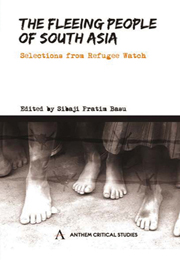Book contents
- Frontmatter
- Contents
- Acronyms and Abbreviations
- Foreword by Ranabir Samaddar
- Preface
- ETHICAL ISSUES
- LAWS
- SOUTH ASIA
- Introduction
- Refugees in South Asia: An Overview
- Internally Displaced Persons in Sri Lanka
- A Matter of Ethnicity
- Scrutinizing the Land Resettlement Scheme in Bhutan
- The Taliban Shelter Seekers or Refugee Warriors?
- Afghan Refugees head for Tajikistan, holed up in the Pamir Mountains
- Impact of International Jurisdiction on Afghan Refugee Rights
- Development Induced Displacement in Pakistan
- On the Trail of Burma's Internal Refugees
- Assault on Minorities in Bangladesh: An Analysis
- Neoliberal Globalization and Women's Experiences of Forced Migrations in Asia
- Who Went Where and How are They Doing? Pakistanis and Indians Outside South Asia
- INDIA
- GENDER
- INTERVIEW/CORRESPONDENCE
- REPRESENTATIONS
- Index
Impact of International Jurisdiction on Afghan Refugee Rights
from SOUTH ASIA
Published online by Cambridge University Press: 05 March 2012
- Frontmatter
- Contents
- Acronyms and Abbreviations
- Foreword by Ranabir Samaddar
- Preface
- ETHICAL ISSUES
- LAWS
- SOUTH ASIA
- Introduction
- Refugees in South Asia: An Overview
- Internally Displaced Persons in Sri Lanka
- A Matter of Ethnicity
- Scrutinizing the Land Resettlement Scheme in Bhutan
- The Taliban Shelter Seekers or Refugee Warriors?
- Afghan Refugees head for Tajikistan, holed up in the Pamir Mountains
- Impact of International Jurisdiction on Afghan Refugee Rights
- Development Induced Displacement in Pakistan
- On the Trail of Burma's Internal Refugees
- Assault on Minorities in Bangladesh: An Analysis
- Neoliberal Globalization and Women's Experiences of Forced Migrations in Asia
- Who Went Where and How are They Doing? Pakistanis and Indians Outside South Asia
- INDIA
- GENDER
- INTERVIEW/CORRESPONDENCE
- REPRESENTATIONS
- Index
Summary
Pakistan in spite of being a developing country has hosted millions of Afghan refugees since the 1970s. Although in the following paragraphs, an attempt has been made to highlight the impediments and shortfalls in Pakistan's Afghan policy, one must keep in mind that the country itself faced a lot of hard times during the Soviet occupation of neighbouring Afghanistan. With inherent problems of its own and usual dilemma faced by a developing Third World country, there was a time when Pakistan had to single-handedly support a burgeoning refugee population, with no donor aid or help coming from any quarters.
Since that time, the Pakistani government has engaged in sporadic efforts to register refugees and to provide some legal protection. In the early 1980s refugee families were issued passbooks. (The issuance of passbooks and identification documents was done according to Article 25 of Chapter 5 dealing with administrative measures in the 1951 Refugee Convention). The passbooks entitled refugees to receive assistance, and they were also used as identity documents. On a sporadic basis for a few years thereafter, the Government of Pakistan issued passbooks to newly arriving refugees for assistance purposes only. The passbooks did not provide identification for the refugees, and as such, provided no legal protection. […]
In spite of the fact that it hosts the largest of the world's refugee population for the past three decades, Pakistan is neither a party to the Refugee Convention, nor its follow-up 1967 protocol.
- Type
- Chapter
- Information
- The Fleeing People of South AsiaSelections from Refugee Watch, pp. 174 - 182Publisher: Anthem PressPrint publication year: 2009

